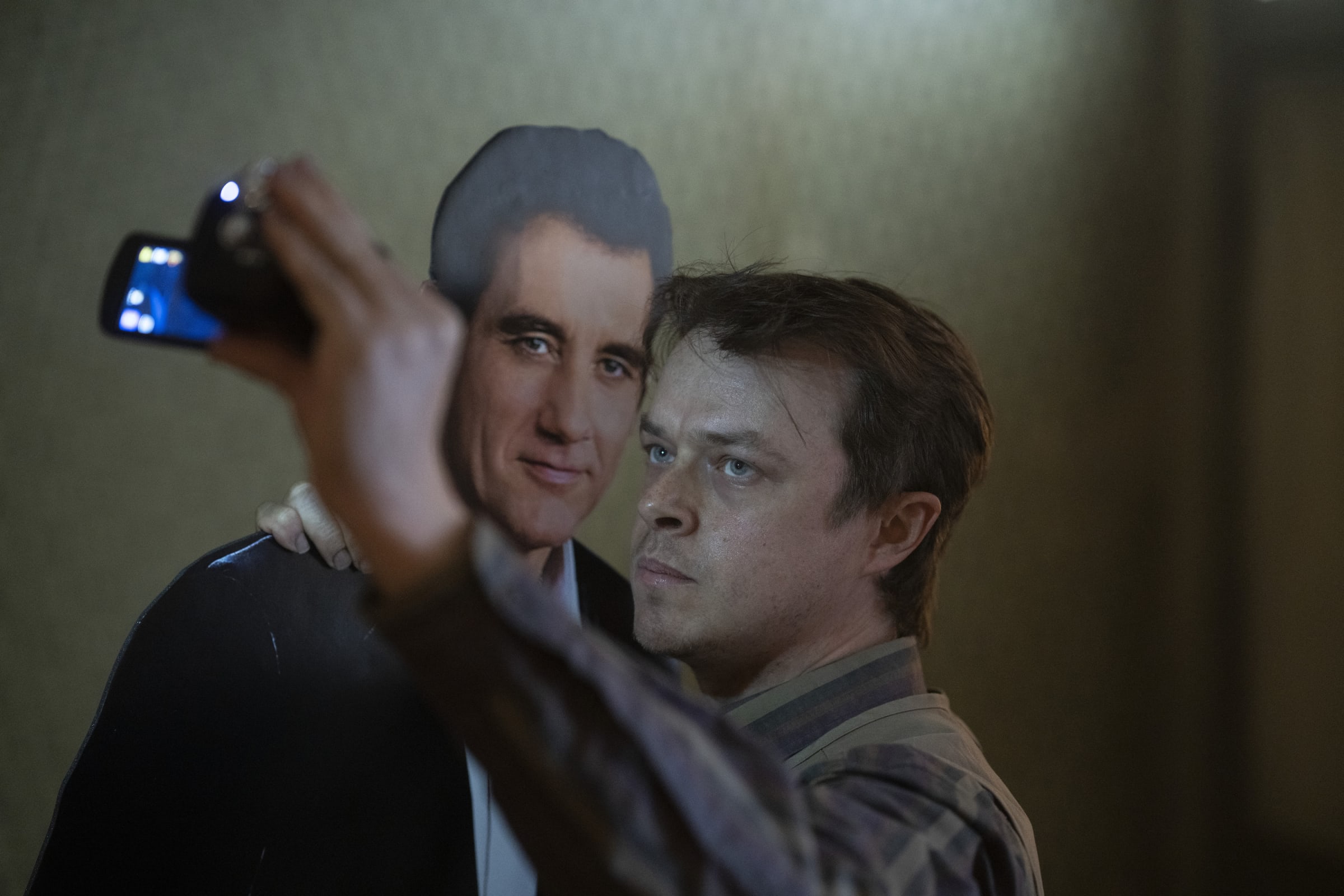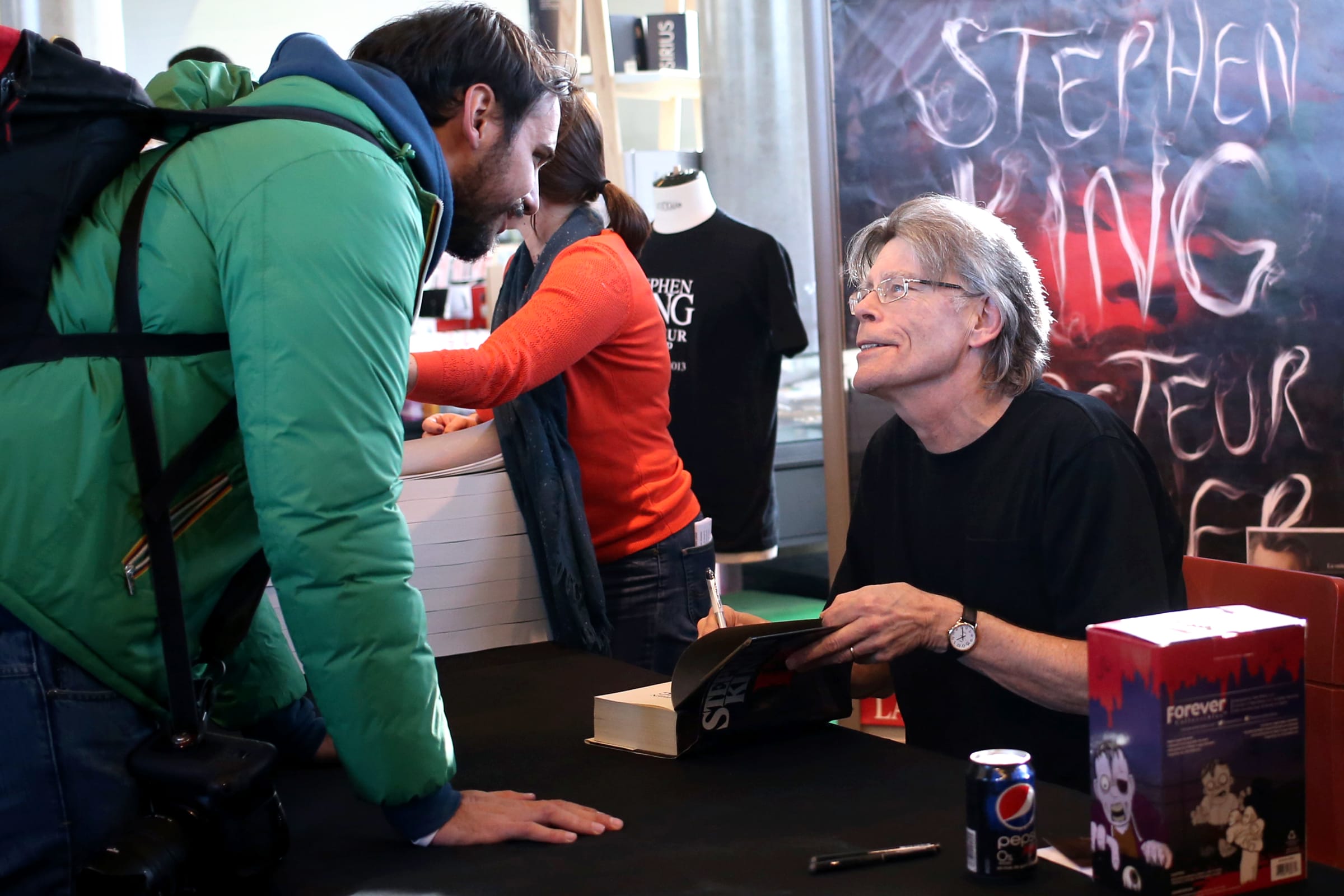Stephen King on Scary Stalkers, Being ‘Canceled’ by J.K. Rowling, and Navigating Trauma

CBS Photo Archive/Getty
The legendary author talks about his new TV series “Lisey’s Story,” the man who broke into his home with a “bomb,” and his fight with J.K. Rowling over trans rights.
Not merely content with being the master of supernatural horror and one of the most prolific authors of his time, with 62 novels under his belt and counting, Stephen King has emerged as the undisputed champ of source material. There are too many classic film adaptations of King works to list them all, from Carrie and The Shining to Misery and The Shawshank Redemption; on the small screen, you have the underrated Mr. Mercedes, starring Brendan Gleeson, along with over a dozen projects in various stages of production—the most promising of which is Lisey’s Story.
Premiering June 4 on Apple TV+, the series centers on Lisey Landon (Julianne Moore) who, while mourning the death of her famous-novelist husband Scott (Clive Owen), begins to relive each of their pasts, real and imagined, revealing a series of shocking truths about his life and death. As if the all-star cast weren’t enough—rounded out by Joan Allen, Dane DeHaan, Sung Kang, and Jennifer Jason Leigh—Lisey’s Story is produced by J.J. Abrams, directed by Pablo Larrain (Jackie), and had all eight of its episodes scripted by none other than King himself.
“I wrote the episodes and got deeply involved in it. I’m pretty invested in that one,” King tells me.
In a wide-ranging talk, the 73-year-old King opened up about everything from his writing process and favorite horror movies to that bizarre episode with Harry Potter scribe J.K. Rowling.
I consider myself somewhat of a fellow Mainer, having gone to college and spent some time up there. What is it about Maine that’s made it such a rich creative reservoir for you?
Ah, well, I grew up here and you write about what you know. It’s comfortable for me, because I know the geography and I know the people. I think people are pretty much the same everywhere, though. When I write about Castle Rock, I’m writing about Norway South Paris, which is just up the road from me. When I wrote about Chester’s Mill, it was basically Bridgton, which is just down the road from me. Knowing the geography puts me in a frame [of mind] and gives me a comfort zone.
You’re so damn prolific. What’s your writing schedule like?
I work every day for about three or four hours. I will go out and walk the dog, try to clear my head and get into a good place, and then I’ll work from, say, eight o’clock till eleven-thirty, or eight o’clock till noon—it depends how it goes that day. I think that if you have a regular schedule like that, you almost fall into a trance automatically. It’s like post-hypnotic suggestion, where you’re ready to work at that time. If I have to work at other times of the day I do, but I don’t love it! So, it’s not a 40-hour week. It’s a 28-hour week, but I still feel like a working guy.
As a Mainer, I’d be remiss if I didn’t ask you about good ol’ Susan Collins. It’s funny, because whenever I go up to Maine, I see so many anti-Collins bumper stickers everywhere, all across the state, and yet she keeps getting re-elected.
There’s a big conservative-Republican, dark-red area of Maine that goes from where I live over in the western part of the state right up through Aroostook County, so she has a base that she can count on, and Lewiston always turns out for her. I think people got a look at her opponent [Sara Gideon] in the debates and decided that she was too young and too inexperienced to do the job. The final nail in the coffin was a Maine personality, Bill Green, who did a show up here for years called Bill Green’s Maine.
He’s one of the faces of Maine—this very cheerful guy who always has loggers on who do sculptures out of chainsaws and that sort of thing—and he came out big for Susan Collins, and the only reason he could do that was because he retired the year before. And what he landed on is that “Susan Collins is one of us” and the opponent, Sara Gideon, was seen as an outsider because she came originally from Rhode Island. The story goes, there were kittens born in an oven and the old Maine guy says, “Well, them kittens was born in the oven but that don’t make ‘em biscuits.” The idea is that it really doesn’t matter where you came from or how long you’ve been here—if you’re from somewhere else, you’re a flatlander. Gideon was seen as that. I was disappointed, but there’s always next time.
Well, at least Trump wasn’t re-elected. I did not sleep very well that week.
It was a terrible two or three days where nobody really knew what was going to happen, and I felt that if Trump got re-elected, I would have to take the gas pipe—not literally, but it was a scary time.
Let’s talk Lisey’s Story. This is exciting. A new show on Apple TV+.
Well, it is to me, because I wrote the episodes and got deeply involved in it. I’m pretty invested in that one.
Oh, I don’t think you’re the only one who’s excited. The book was inspired by you being struck by a van up in Maine, right?
Yeah, I was struck by a vehicle. Then I got better, and a couple of years later I got pneumonia, and I was in the hospital for three or four weeks. I just barely ducked under the side of the Grim Reaper, if you will. While I was in the hospital, my wife decided that she was going to clean out and rearrange my office, which had just been gathering crap for years. When I got back from the hospital, she said, “Don’t go up there. You won’t like it because it’s not done yet.” So, I went up there and everything was empty, and I thought to myself, “This is what it’s going to look like when I die, when someone’s cleaned out all the stuff.” And it gave me an idea for a book, and that book became Lisey’s Story.
Lisey’s Story is also an exploration of trauma, and the after-effects of trauma—something that this country is historically not very good at dealing with.
I’m fascinated as a novelist with the idea of grief and mourning. It’s something that a lot of novelists kind of gloss over and pass by. A character will say, “My parents died in a car accident,” and that’s about it. But grief is a long-lasting emotion. I went into it to some degree in a book called Pet Sematary a long time ago, and I wanted to talk a little bit about what happens when you lose a life partner that you’ve been with for a long period of time. You have that life investment in another person—and suddenly they’re gone.
The book—and series—also deals with a deranged stalker, and I’m curious if you’ve ever had any scary stalker experiences yourself.
Sure. A few a lot of years ago. When my younger son was about 11 years old, he really wanted to go to a pro basketball game, and he was a really big 76ers fan. So, we went to Philly and saw the Celtics play the 76ers and stayed overnight. Back home, my wife wakes up in the house alone, and she hears shattering glass. She went downstairs, and there was a crazy guy in the kitchen. He’d broken in and had a package which he said was a bomb. He said, “Your husband—I want to kill him because he stole my aunt’s story from Misery.” He was a guy from Texas, and I’d never heard about him or his aunt. The “bomb” ended up being a bunch of pencils that were wired together with bread wrappers and erasers—the guy was really off his nut—but my wife took one look, dodged around him, and ran across the street in her nightgown and bare feet to a neighbor’s house, and called the cops. He ended up in a mental institution.
There’s another guy named Steve Lightfoot who goes around in a van, and he’s convinced that I’m the shooter that killed John Lennon—in collaboration with Ronald Reagan and Richard Nixon—and that I’m living in some kind of witness protection program from the federal government. So yeah, there’s crazy people out there. No doubt. The guy in Lisey’s Story isn’t based on any of those people, really. I just think about John Lennon and how he was killed by a fan, or somebody like Squeaky Fromme, who took a shot at the president and missed, or the guy [John Hinckley Jr.] who shot Reagan. There are a lot of crazies out there and they have access to guns. We see it every day.

Dane DeHaan as the stalker Jim Dooley in Lisey's Story
Apple TV+
There’s constant conversation going on these days about “cancel culture.” Just the other day, a horse owner blamed “cancel culture” for his horse testing positive for performance-enhancing drugs. How do you feel about this strange debate? It mostly seems to be deployed by those on the right when having to answer for bad things they’ve done.
Yes, well, Tucker Carlson and Sean Hannity and all those people rail against “cancel culture” but they won’t say anything about the Republicans canceling Liz Cheney because she insisted that Trump was lying about all these things—which of course he was. Trump can’t deal with the idea of being a loser, and he started this thing that it would be a “stolen election,” the Big Lie, beforehand to hedge his bets. If he won, all was good; if not, it was a no-lose situation because he could always say that the thing was stolen from him, and his people would believe him. Along comes Liz Cheney and says, “That’s nothing but a fucking lie. He lost the goddamn election and you’re just making things worse.” So, the Republican House just turned around and canceled her—but they won’t talk about that. There’s a double standard there.
As far as “cancel culture” itself goes, all that’s happening here—and I think a lot of conservatives hate it—is that the way they’re used to doing business no longer works as well as it used to. You’re going to be held accountable for what you say and what you do. That’s the American way, OK? There’s nothing odd about that, and there’s nothing radical about that. If you do the crime, you gotta do the time.
One thing I’d like to give you credit for is calling out J.K. Rowling for all her anti-trans proselytism. There was this bizarre exchange, wherein you responded to a fan’s tweet saying, “Trans women are women,” and she reacted by blocking you on Twitter and deleting a tweet praising you.
Jo canceled me. She sorta blocked me and all that. Here’s the thing: She is welcome to her opinion. That’s the way that the world works. If she thinks that trans women are dangerous, or that trans women are somehow not women, or whatever problem she has with it—the idea that someone “masquerading” as a woman is going to assault a “real” woman in the toilet—if she believes all those things, she has a right to her opinion. And then someone tweeted at me, “Do you think trans women are women?” and I said, “Yes, I do.” And that’s what she got angry about—my opinion. It’s like the old saying, “I don’t agree with what you say, but I will defend to the death your right to say it.” So, nobody has “canceled” J.K. Rowling. She’s doing fine. I just felt that her belief was, in my opinion, wrong. We have differing opinions, but that’s life.
It’s fascinating, because J.K. Rowling was the most famous signatory to the so-called “cancel culture” letter in Harper’s, and this to me seems indicative of the way a lot of the “cancel culture” crowd acts. She’s trying to “cancel” an entire group of people, and then you respond by merely saying, “Trans women are women”—your belief—and then she blocks you on social media.
Yes. But keep in mind too that Jo’s opinion on trans women is an outlier in her entire political spectrum. She was very much anti-Brexit and very much anti-Trump. She’s on the side of the angels in most respects, but she does have this one thing that she’s very vehement about. No doubt.
On a much lighter note, I saw a very fun tweet the other day that said something to the effect of, “You’re on a date, and the person says this is their favorite book, causing you to immediately run out of the restaurant. What’s that book?” What is the book be for you?
Oh, I don’t know!
For me, aside from something like Mein Kampf, I’d maybe say Atlas Shrugged.
For me, I’d say any book by Bill O’Reilly.
Since you are a master of horror, and I’m a huge horror-movie fan, I’m curious what some of your favorite horror movies are.
John Carpenter’s The Thing is a great movie. There’s a lot of stuff by David Cronenberg from the early days. He did a film called The Brood which was fantastic. There’s a very scary movie with George C. Scott called The Changeling, that I liked very much. I would have to say Marathon Man, too. It’s not a scary movie or anything, but that thing with the dentist saying, “Is it safe? Is it safe?”—that’s classic horror as far as I’m concerned. Wait Until Dark with Audrey Hepburn is another one.

Kenzo Tribouillard/AFP/Getty
Have you seen Takashi Miike’s Audition? That’s one of my favorites.
I did! Yes, I did. I just saw Eraserhead for the first time. That gave me the creeps. The little baby? That was pretty scary!
I’d say that 99 percent of the time the book is better than the film adaptation, but are there any film adaptations that you think are better than the book?
Well, I think that Brian De Palma’s film of Carrie is better than the book. It’s a question I’d have to chew over… I guess I would have to say Godfather I and II are probably better than the books. The books are good—they’re very plainspoken books—and the films are probably more artistic. Silence of the Lambs is a great movie, but I think the book is pretty great too, so that’s probably a dead heat.
I’m sure you get asked this all the time, but how do you stay so damn prolific? And you’ve got no plans of hanging it up, right? You’re still plugging away at a rate that puts a lot of writers to shame.
I’ve been busy—and I stay busy. I don’t go out or party a lot. I don’t do any drugs or alcohol, so that helps. Man, I don’t know! I enjoy what I do, so that’s probably key to it. As far as hanging it up, I can’t see doing that. You know how it is when somebody gets really old and the grown-up children come to them and say, “Dad, it’s time to turn over your car keys.” So, I can see coming to a point where my family would come to me and say, “Steve, continue to write and amuse yourself, but really, don’t embarrass yourself in public.”
